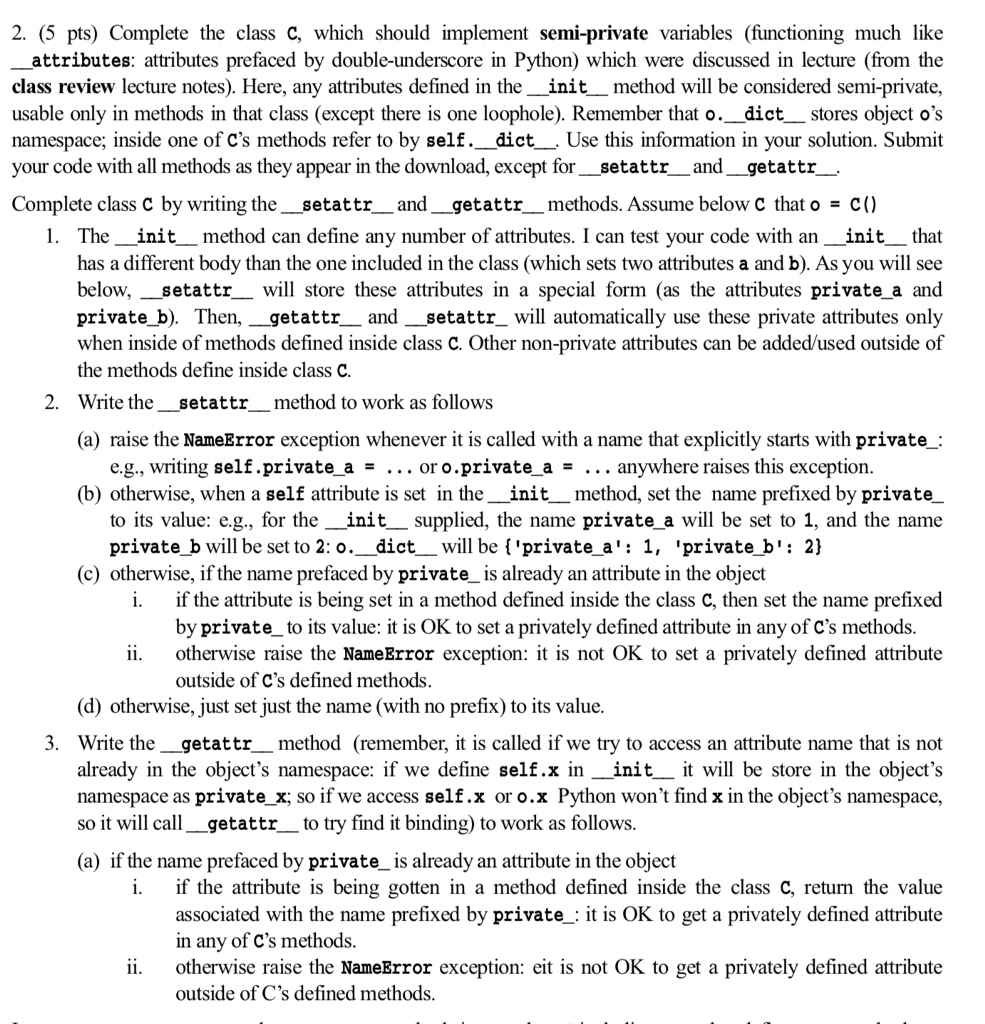PYTHON, Classes with Overloaded Operators
all parts 1,2,3 are in connection to each other so please answer ALL parts! 
2. (5 pts) Complete the class c, which should implement semi-private variables (functioning much like attributes: attributes prefaced by double-underscore in Python) which were discussed in lecture (from the class review lecture notes). Here, any attributes defined in the_init_ method will be considered semi-private, usable only in methods in that class (except there is one loophole). Remember that o._dict_stores object o's namespace; inside one of C's methods refer to by self. dict__ Use this information in your solution. Submit your code with all methods as they appear in the download, except for_setattr _and__getattr Complete class C by writing the_setattr__and_getattr__methods. Assume below C that o - C) 1. The_init_ method can define any number of attributes. I can test your code with an_init_ that has a different body than the one included in the class (which sets two attributes a and b). As you will see below, _setattr_ will store these attributes in a special form (as the attributes private a and private, b). Then,-getattr-and-setattr-will automatically use these private attributes only when inside of methods defined inside class C. Other non-private attributes can be added/used outside of the methods define inside class C. 2. Write the setattr_ method to work as follows (a) raise the NameError exception whenever it is called with a name that explicitly starts with private_: e.g., writing self.private a - oro.private a - anywhere raises this exception (b) otherwise, when a self attribute is set in the_init_ _method, set the name prefixed by private_ to its value: e.g., for the init_supplied, the name private_a will be set to 1, and the name private b will be set to 2: o._dict _will be f 'private a': 1, 'private b': 2) (c) otherwise, if the name prefaced by private_ is already an attribute in the object i. if the attribute is being set in a method defined inside the class C, then set the name prefixed by private_ to its value: it is OK to set a privately defined attribute in any of C's methods ii. otherwise raise the NameError exception: it is not OK to set a privately defined attribute outside of C's defined methods (d) otherwise, just set just the name (with no prefix) to its value Write the-getattr method (remember, it is called if we try to access an attribute name that is not already in the object's namespace: if we define self.x in init it will be store in the object's namespace as private x; so if we access self.x or o.x Python won't find x in the object's namespace, so it will call_getattr_to try find it binding) to work as follows (a) if the name prefaced by private_ is already an attribute in the object 3. i. if the attribute is being gotten in a method defined inside the class C, return the value associated with the name prefixed by private_: it is OK to get a privately defined attribute in any of C's methods ii. otherwise raise the NameBrror exception: eit is not OK to get a privately defined attribute outside of C's defined methods 2. (5 pts) Complete the class c, which should implement semi-private variables (functioning much like attributes: attributes prefaced by double-underscore in Python) which were discussed in lecture (from the class review lecture notes). Here, any attributes defined in the_init_ method will be considered semi-private, usable only in methods in that class (except there is one loophole). Remember that o._dict_stores object o's namespace; inside one of C's methods refer to by self. dict__ Use this information in your solution. Submit your code with all methods as they appear in the download, except for_setattr _and__getattr Complete class C by writing the_setattr__and_getattr__methods. Assume below C that o - C) 1. The_init_ method can define any number of attributes. I can test your code with an_init_ that has a different body than the one included in the class (which sets two attributes a and b). As you will see below, _setattr_ will store these attributes in a special form (as the attributes private a and private, b). Then,-getattr-and-setattr-will automatically use these private attributes only when inside of methods defined inside class C. Other non-private attributes can be added/used outside of the methods define inside class C. 2. Write the setattr_ method to work as follows (a) raise the NameError exception whenever it is called with a name that explicitly starts with private_: e.g., writing self.private a - oro.private a - anywhere raises this exception (b) otherwise, when a self attribute is set in the_init_ _method, set the name prefixed by private_ to its value: e.g., for the init_supplied, the name private_a will be set to 1, and the name private b will be set to 2: o._dict _will be f 'private a': 1, 'private b': 2) (c) otherwise, if the name prefaced by private_ is already an attribute in the object i. if the attribute is being set in a method defined inside the class C, then set the name prefixed by private_ to its value: it is OK to set a privately defined attribute in any of C's methods ii. otherwise raise the NameError exception: it is not OK to set a privately defined attribute outside of C's defined methods (d) otherwise, just set just the name (with no prefix) to its value Write the-getattr method (remember, it is called if we try to access an attribute name that is not already in the object's namespace: if we define self.x in init it will be store in the object's namespace as private x; so if we access self.x or o.x Python won't find x in the object's namespace, so it will call_getattr_to try find it binding) to work as follows (a) if the name prefaced by private_ is already an attribute in the object 3. i. if the attribute is being gotten in a method defined inside the class C, return the value associated with the name prefixed by private_: it is OK to get a privately defined attribute in any of C's methods ii. otherwise raise the NameBrror exception: eit is not OK to get a privately defined attribute outside of C's defined methods







